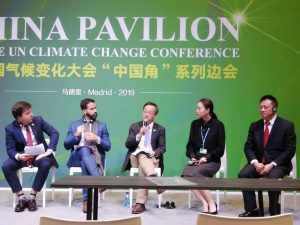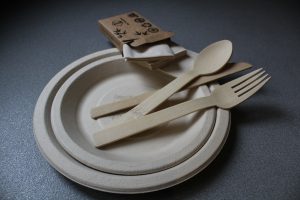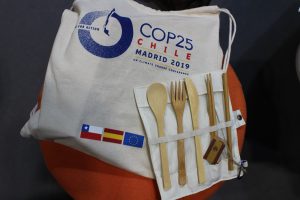12 December, Madrid – Widespread, versatile and with the ability to store large amounts of carbon, bamboo could be a critical resource in helping a number of developing countries meet their climate change commitments. At the UN Framework Convention on Climate Change’s (UNFCCC) annual Conference of the Parties (COP), hosted by Chile in Madrid, Spain, INBAR promoted this grass plant in a number of key events.

INBAR Director General Ali Mchumo spoke alongside Thelma Krug, Vice-Chair of the Intergovernmental Panel on Climate Change, Marcelo Poppe, Coordinator for Sustainable Development at CGEE, and Jorge Chediek, Director of the UNOSSC
As a fast-regenerating and versatile resource, bamboo can make important contributions to the bioeconomy. On Monday 9 December, INBAR co-hosted an event with the UN Office for South-South Cooperation (UNOSSC) and Brazil-based organisation the Center for Management and Strategic Studies (CGEE), to launch a report on the bioeconomy and climate change. Produced by the UNOSSC and CGEE, the publication includes a case study from INBAR, about a recent bamboo sector development project in East Africa. Speaking at the event, INBAR representative Charlotte King summarised the project’s potential for the bioeconomy: as well as building capacity for some 7000 people to produce biobased bamboo products, the project has also planted 900 hectares of bamboo on degraded land. Within 40 years, the carbon stored in the bamboo plantation, and ‘avoided’ by substituting bamboo products for wood-based or manmade materials, could amount to almost 600,000 tonnes carbon dioxide. According to King, “This project just goes to show the potential of biobased solutions in substituting manmade materials, and building truly sustainable development.”
Bamboo can be a particularly important replacement to plastics. In keeping with COP 25’s focus on oceans, and related concerns about plastic pollution, INBAR and the International Centre for Bamboo and Rattan co-hosted an event on Wednesday 11 December, about ‘Bamboo as a substitute for plastics’. A number of high-level representatives from the UN, international organisations, countries, and the private sector discussed recent developments in bamboo manufacturing, and displayed a number of biobased, recyclable ‘single-use’ bamboo goods.
Speaking on behalf of the UNOSSC, Jorge Chediek, spoke about the versatility of bamboo. “Bamboo, that magic product… It can make pipes, it can make cutlery. I really look forward to having more bamboo and less plastic in our lives.”
Gerhard Dieterle, Executive Director of the International Tropical Timber Organization, said that bamboo and timber make a “natural combination”, and highlighted bamboo’s importance for income generation: “Bamboo, unlike any other natural resource, can contribute to poverty alleviation and local development.” Crucially, “bamboo can help bridge the time until high-value forest resources, like teak, can mature”, providing a quick source of income to rural communities. Dr. Dieterle concluded by reaffirming that the ITTO is very happy to work with INBAR to build more sustainable forestry value chains.
Mr. Jorge Chediek, Director of UNOSSC; Dr. Martin Frick, a Senior Director at UNFCCC; Dr. Gerhard Dieterle, Executive Director of ITTO; and Trinh Thanh Long, GABAR Coordinator at INBAR.
Martin Frick, Senior Director for Policy and Programme Coordination at the UNFCCC, also emphasised bamboo’s importance as a tool for poverty alleviation as well as climate change mitigation. “Every climate solution must start with bringing people out of poverty.” For Dr. Frick, bamboo can be an important part of the climate change solution. “What we need is for bamboo ambitions to be present in Glasgow [COP 26].”
Trinh Thanh Long, speaking on behalf of INBAR, discussed the market potential for bamboo plastics. The world currently consumes some 400 million tonnes of plastic per year, but only 9% of plastics produced since 1950 have been recycled. Bamboo can provide a biobased and low-carbon alternative to a number of materials, from single-use plastics to PVC, but more support is needed to make these products cost-competitive. This may happen sooner rather than later: “With the EU ban on single-use plastics, and other countries set to follow suit, there is increasing interest in sustainable alternatives. Bamboo can be a low-carbon, recyclable, biobased material for the future – a real ‘green gold’.”

Bamboo crockery from Rui Bamboo was distributed to participants of INBAR events at COP 25.
In a panel discussion following the speeches, representatives from the International Centre for Bamboo and Rattan (ICBR), the government of Ecuador, bamboo food packaging company Rui Bamboo, and bamboo furniture company Ningbo Shilin Arts & Crafts, discussed the current status and outlook of bamboo plastics. Steven Petersen, Deputy Secretary for Climate Change of Ecuador, summarised some of the Ecuador government’s recent moves to reduce single-use plastic, including a tax on plastic bottles, and said that capacity building within government is essential to promote alternatives. Wang Jianzhong, Chairman of Rui Bamboo, agreed, and mentioned the importance of awareness-raising: “Consumers and countries are not always aware of bamboo’s benefits, and it makes them sceptical.” Panelists also agreed that more research was critical to improve bamboo plastics’ uses and performance, and Li Zhiyong, ICBR’s Chief Expert on the Green Economy, highlighted ICBR’s work in this regard, providing technical support to the private sector on new technologies. Overall, panelists were very positive about the outlook for bamboo plastics. Ningbo Shilin is a major supplier of bamboo furniture to IKEA, and Rui Bamboo is in discussions with Air China to use bamboo cutlery, not plastic, on flights. Ningbo Shilin’s Wang Xiaoqing is optimistic about bamboo’s outlook: “I believe bamboo will be more widely used in the future… It just makes more sense than timber.” Li Zhiyong agreed: “At UNFCCC COP 21, four years ago, all participants were given plastic cups… This year, we’ve been given bamboo cutlery!”
As well as participating in events, INBAR also made a statement in its role as Observer to the UNFCCC. In the High-Level Session on Tuesday 11, INBAR Director General Mr. Ali Mchumo spoke in plenary to remind delegates of bamboo’s importance. “Bamboo can play an important role in climate change mitigation and adaptation, as a fast-growing carbon sink, a source of low-carbon, durable products, an excellent building material for housing, an effective tool for environmental protection, and a hardy, resilient source of employment.” He finished by reminding governments of INBAR’s willingness to help countries integrate bamboo: “INBAR stands ready to work with its Member States and other countries, to support them to integrate bamboo into their national climate strategies and international climate change mechanisms.”
In this spirit, INBAR used its presence at COP 25 to host a number of bilateral meetings with Member States, including Ministers from Indonesia, Peru and Uganda. All meetings concluded with concrete ‘next steps’ on how INBAR can help its Member States to include bamboo and rattan as nature-based solutions for sustainable development.
Throughout the week, INBAR hosted a ‘bamboo watch’ on social media, encouraging participants at COP 25 to identify products made from bamboo or rattan. Aside from bamboo cups and tissues distributed at points throughout the venue, bamboo cutlery and rattan furniture were spotted, and the Indonesia Pavilion featured lightweight bamboo structures. As a fast-growing source of material which can be used to make durable, low-carbon products, both rattan and bamboo products can play an important part in the climate solution – something INBAR hopes will be reflected in future COPs.
To find out more about bamboo’s importance for climate change, read here.
To sign up for the INBAR newsletter, click here.
INBAR’s panel at the event ‘Bamboo as a substitute for plastics’: Steven Petersen, Deputy Secretary for Climate Change of Ecuador; Dr. Li Zhiyong, Chief Expert on Green Economy, ICBR; Mrs. Wang Xiaoqing, General Manager, Ningbo Shilin Arts & Crafts; Mr. Wang Jianzhong, Chairman of the Board, Chongqing Rui Zhu Plant Fiber Products Co., Ltd

Bamboo crockery, a sustainable alternative to biobased plastic, was distributed to all participants at COP 25.